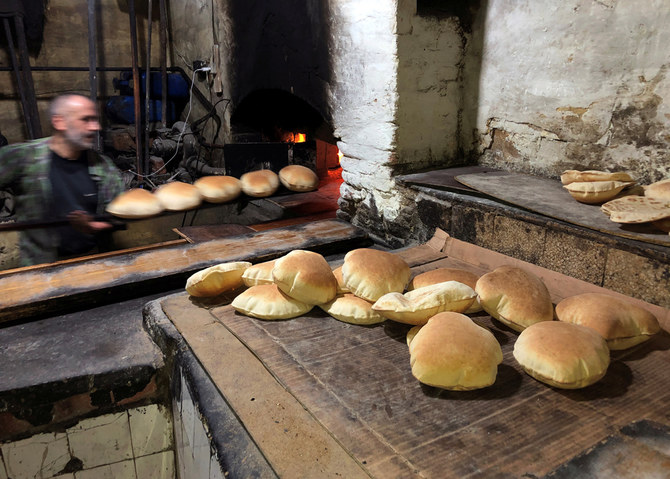BEIRUT: The Lebanese pound reached 33,000 to the US dollar on Lebanon’s black market on Monday.
Protesters blocked roads in response to the news, which were quickly reopened by the Lebanese Armed Forces, with further demonstrations expected in the days ahead, with Thursday expected to see serious trouble due to impending fuel supply issues.
With the retail price of one bread packet reaching 10,000 pounds, the head of the Bakery Owners Syndicate, Ali Ibrahim, warned that bread may no longer be available in sufficient quantities due to shortages of wheat and flour in the country because of late payments for imports.
“The current price of bread is determined by the Ministry of Economy based on the exchange rate of the dollar at 30,000 Lebanese pounds, but with the exchange rate of the dollar on the black market exceeding this figure, the price of the bread packet is likely to rise further,” he said.
People queued in front of petrol stations on Monday night over fears of rising fuel prices, causing dozens to close early.
A representative for Lebanon’s fuel distributors, Fadi Abou Shakra, noted that the “crazy rise in the exchange rate of the dollar will cause the price of hydrocarbons to rise on Tuesday.”
He said: “Fuel derivatives have been distributed based on the price of 28,000 pounds per US dollar while the black market’s US dollar exchange rate has exceeded 30,000 pounds. This is an outright cause of destruction and bankruptcy for institutions, fuel distributors, and gas station owners, as well as for Lebanese citizens who have been bearing the brunt of the extremely hefty prices.
“We support Thursday’s rally,” he continued, pointing out that fuel will not be distributed on Thursday “because the demands of the transport unions are righteous, and they represent those of every Lebanese citizen.”
The pandemic has caused further disruption, with several Ministry of Finance officials involved in completing the draft budget infected with the virus, delaying its referral to the secretary-general of the Cabinet.
Social Affairs Minister Hector Hajjar said that “the (number of) Lebanese families registered for two long-awaited cash assistance programs has reached within a month 410,000, or 1.6 million individuals from different regions, with Akkar in northern Lebanon topping the list, followed by Baabda, Tripoli, Baalbek, Beirut and Zahle. The data shows that 59 percent of registered individuals are unemployed.”
President Michel Aoun’s abstention on signing decrees on the payment of salaries to more than 6,000 people in state institutions, meanwhile, was blamed on “the failure of the council of ministers to convene.”
In a statement, the president’s office said: “It is not possible to issue exceptional approvals under a government that is neither resigning nor in the caretaker phase.”
Meanwhile, relatives of soldiers and retirees joined protests in front of Lebanese Army barracks after the military’s monthly salary fell below $37.
Prime Minister Najib Mikati agreed with Aoun on Jan. 5 to sign a decree to open an extraordinary session of Parliament to sign exceptional approvals related to transport allowances for military and security entities, increasing the transport allowance to 65,000 pounds for the private sector and 64,000 pounds for the public sector, grant a one-and-a-half month salary to public sector employees during November and December 2021, and renew contractor deals with the state.
The country’s political deadlock has been exacerbated by Hezbollah and the Amal Movement refusing to attend any Cabinet sessions unless Tarek Bitar, the judge leading the probe into the Beirut port blast in 2020, is removed.
Aoun has called for an urgent national dialogue between the country’s governing parties, and met with head of Loyalty to the Resistance bloc MP Mohammad Raad at the Baabda Palace on Tuesday, who said the bloc supported the invitation.
Marada Movement leader Sleiman Frangieh, though, announced he will boycott the dialogue, along with the Lebanese Forces and the Future Movement. “Dialogue should be between two sides, not one,” Frangieh said.
Meanwhile, a large group of Lebanese politicians have established a new opposition group to end what they call Iranian occupation of Lebanon through Hezbollah.
During a Zoom press conference held in Beirut on Monday, attended by about 200 politicians, academics and key figures in Lebanese civil society, the National Council for Ending the Iranian Occupation was officially launched.
In a late development on Tuesday, Judge Ghada Aoun, Mount Lebanon’s attorney general, slapped a travel ban on the governor of Lebanon’s central bank, Riad Salameh, in connection with a lawsuit filed against him by activists.
The move followed a complaint submitted by the legal department of The People Want Reform of the System group, represented by lawyers Haitham Ezzo and Pierre Gemayel.
In its complaint, the group accused Salameh of “the embezzlement and squandering of public money for personal benefits, illicit enrichment, and money laundering,” calling him “the godfather of the deals of the political juntas and the head of the banking system that robbed people’s deposits and undermined the state’s financial standing.”



























